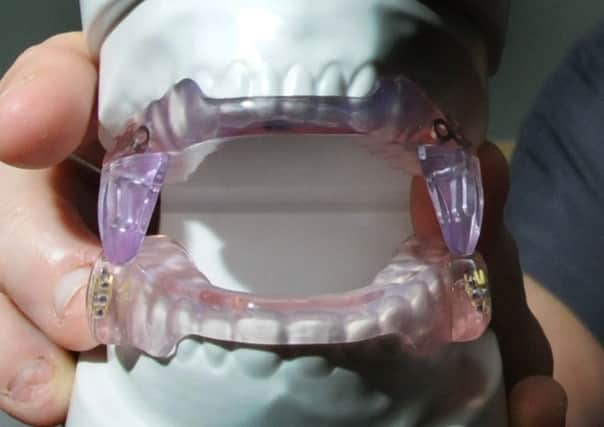Dental snore cure a roaring success


Walrus-like roaring come lights-out can put real pressure on marriages and some partners regularly have to chose the spare room to enjoy a decent night’s rest.
But it can also be a sign of the onset of much more serious health risks, such as Obstructive Sleep Apnoea (OSA) which has links with potentially fatal heart disease and stroke and affects twice as many males than females,
Advertisement
Hide AdAdvertisement
Hide AdNow a Wigan dentist with a reputation for pioneering the science of oral health and wellbeing, is offering ground-breaking help for sufferers.
Barry Rimmer, principal at Ashton Dental Practice, offers a sleep study programme which records sleep patterns at home over two or three nights.
He then analyses the results to determine the severity of the condition.
And if serious enough, he will fit a custom-made appliance - a type of specialist brace that fits over the teeth - for patients to wear as they sleep.
Advertisement
Hide AdAdvertisement
Hide AdThere are a range of devices available to suit different needs and pockets.
One in particular has enjoyed a “truly excellent 98 per cent success rate” during the eight months he has now been offering the service.
After a couple of weeks of wearing the device, the sleep study is then repeated to measure any improvements.
It’s a service unique in the north of England, he believes.
OSA can cause some snorers to stop breathing - only to start again after a few seconds, often with an alarming rasp, choke or snort.
Advertisement
Hide AdAdvertisement
Hide AdIn anopeic episodes the body is starved of oxygen and deprived of restful sleep.
This can lead to feeling tired and sleepy and exhausted during the day as well as leading to higher stress levels, blood pressure and an increased risk of the onset of diabetes.
But it can also cause headaches, heartburn and even stroke.
If you snore, you don’t necessarily have sleep apnoea - but if you have sleep apnoea, said Barry, you will certainly snore.
If patients qualify he can fit one of up to five different designs of Mandibular Advancement Device oral appliance...similar to braces used for straightening teenager’s teeth.
Advertisement
Hide AdAdvertisement
Hide AdSome countries’ motor insurance companies stipulate them for professional heavy lorry drivers to help prevent them falling asleep - or becoming drowsy - behind the wheel.
His surgery have carried out up to 50 sleep studies on Wigan patients.
Mr Rimmer, a full member of the British Society of Dental Sleep Medicine with more than 100 separate dental qualifications, said that a lot of people grind their teeth - known as Bruxism - which disturbs their sleep.
But for many years the dental profession had assumed it was seemingly unrelated to anything else.
Advertisement
Hide AdAdvertisement
Hide AdHe revealed: “Modern research has now turned all that on its head.
“We now know, especially with people who grind or clench their front teeth, that they have a sleep disorder and the vast majority have OSA.
“They are grinding their teeth at the front to keep the jaw forward so that they can breath.
“For years dentists, myself included, have used night guard devices for patients who grind their teeth. What we do now is offer patients a sleep study using Spanish technology.
Advertisement
Hide AdAdvertisement
Hide Ad“They take a little box home over a few nights and it tests them for several different areas and it tells us whether they have sleep apnoea, the degree of it, the oxygenation of their body and how it is dropping or not dropping and how much they are snoring.
“This enables us to decide if the sleep apnoea is severe enough or us to treat or whether the patient should be referred on to their GP or to the various sleep clinics run by the NHS.
“Our focus has always been from the dental perspective because of the wear of teeth.”